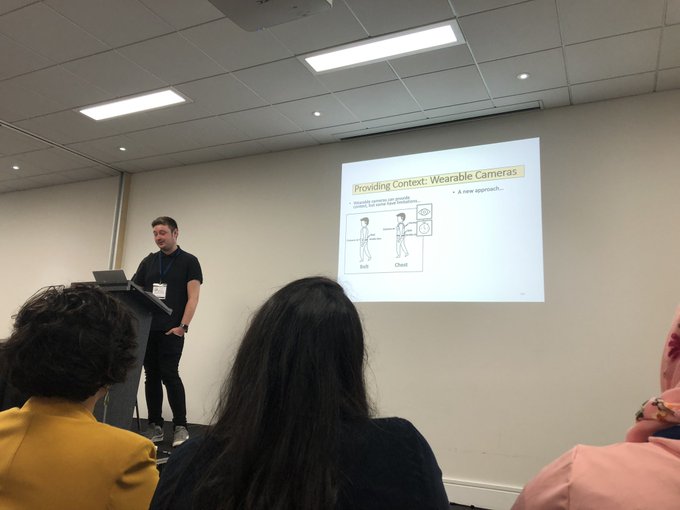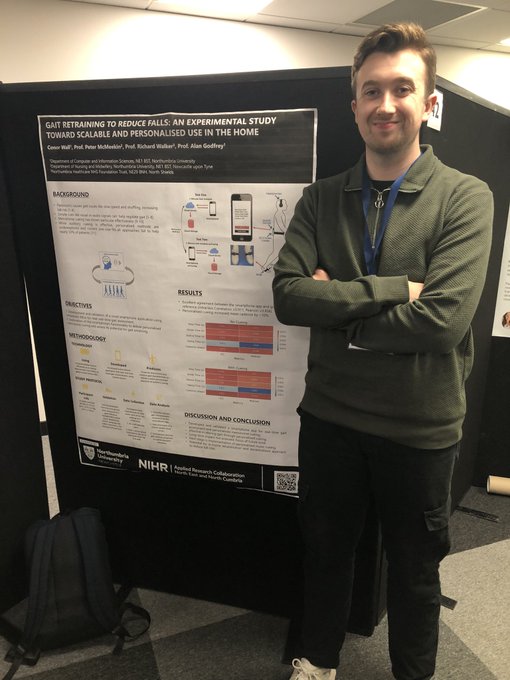ARC PhD students present innovative computing approaches to reducing risk of falls at national conference.
Blog

Jason Moore and Connor Wall are PhD students supported by the NIHR Applied Research Collaboration (ARC) North East and North Cumbria and Northumbria University.
In November they presented their work, which explores how innovative technology can be used to reduce the risk of falling in vulnerable groups, at the annual UK Public Health Science Conference in London.
Jason Moore’s work centres on integrating artificial intelligence (AI) based computer vision techniques to better inform fall risk in people with Parkinson’s disease (PD). Specifically, using wearable cameras and AI to better inform intrinsic and extrinsic factors free-living fall risk assessment.
Conor Wall’s PhD focuses on the development of a smartphone application for walking/gait retraining to reduce fall risk in people with Parkinson’s disease. This includes exploring personalised music cues to via pervasive technology.
In this blog, they share their reflections on contributing to the event.
The UK Public Health Science Conference invites voices from many sectors and disciplines to delve into the multifaceted landscape of public health. This year, the conference’s focus on an ageing population resonated deeply with us both, as it mirrored the essence of our research. The overarching theme spotlighted the challenges accompanying an ageing society, emphasizing the increased strain on healthcare systems and the pressing need for innovative solutions. Both our accepted research abstracts aligned with that narrative, seeking to offer nuanced solutions to the evolving health demands of older populations. Attendance at the conference was particularly exciting as all research presented has been published in The Lancet.
On the day prior to the conference, we attended the Early Career Researcher event held at the Waterloo Action Centre which was an invaluable opportunity to be engage with a network of PhD students and experienced public health professionals. The event was very insightful, offering a platform to engage with peers and esteemed speakers where their discussions painted a picture of the realities embedded within public health research while shedding light on the diverse career trajectories within the field. The interactions and discussions during this event not only provided valuable perspectives on the multifaceted nature of public health but also created a platform for engaging in meaningful dialogues about our research and the diverse studies of fellow participants, enriching our collective understanding.
The main conference held the following day and brought together a range of public health experts and researchers. This gathering was marked by a broad spectrum of research topics, presented through both oral presentations and engaging poster displays, while also having several keynote addresses from esteemed speakers Professor Andrew Steptoe, Derek Walker, Professor Hilary Graham, and Professor Tracy Daszkiewicz. We felt these speakers were especially insightful, with each contributing profound observations and experiences into how the public health landscape has changed over the years and how they themselves have impacted public health in their own unique research fields. Furthermore, discussions on intergenerational justice sparked contemplation on how our work intersects with broader public health interventions.
We questioned the potential impact of our innovations on the health trajectory of younger generations amidst the challenges posed by an ageing society. The alignment of our research with the conference theme prompted valuable reflections on how our respective technological advancements could complement each other to craft comprehensive, lifelong interventions.
For this conference, we both were invited to deliver presentations, sharing with our peers the insights and findings from our abstracts.
Jason said: “I gave a 10-minute oral presentation, which centred around showcasing the advancements in object detection models aimed at automatically labelling environmental factors within free-living based scenarios. This is achieved using wearable video glasses and I discussed how the models I have been developing hold the potential to contextualize and understand the surroundings of individuals with Parkinson’s disease. By leveraging AI-driven object detection techniques, this research strives to provide insights into the environmental factors influencing the condition and, consequently, contribute to more tailored interventions for improving the daily lives of those affected.
“I also participated in a panel discussion which gave me the opportunity to receive interesting questions on the timeframe of the ability to actively monitor and better inform fall risk through contemporary technologies within the home and community.”

Pictured: Jason presents his work
Conor said: “My poster presentation showcased the initial phase of his novel smartphone application development, along with the encouraging results from its validation study. The application, tailored for gait retraining in individuals with Parkinson’s disease, utilizes personalised music cues as a novel walking guidance tool, where the preliminary data presented revealed the potential of this intervention to significantly enhance gait and mobility, which could reduce falls.
“The reception of my poster was overwhelmingly positive, sparking considerable interest among fellow academics, which led to numerous engaging conversations, where insightful ideas were exchanged about the future possibilities and enhancements of the application.”

Pictured: Connor with his research poster
In summary, the UK Public Health Conference served as a very valuable experience for us both, allowing us to immerse ourselves in an environment of knowledge and experience in public health, while also allowing us to showcase the research we have been doing so far during our PhDs. The conference’s thematic focus on an ageing population resonated profoundly with our work, underlining the significance of our research in addressing the complex challenges faced by older demographics. Our work and subsequent presentations not only showcased our contributions but also prompted reflections on how our innovations intersect with the broader context of public health interventions, particularly in shaping the health trajectories of different generations amidst an ageing society. All in all, this experience has strengthened our commitment to leveraging technology and innovation for the betterment of public health for current and future generations.
We are very grateful to the support of the NIHR Applied Research Collaboration North East and North Cumbria as well as the Faculty of Engineering and Environment at Northumbria University for supporting our PhDs. We are also grateful to the Department of Computer and Information Sciences for supporting our travel to London to participate in the conference.
Research presented by both students is now available to read in The Lancet.
Read Jason’s research abstract in The Lancet – Better informing everyday fall risk assessment: experimental studies with contemporary technologies
Read Conor’s research abstract in The Lancet – Gait retraining to reduce falls: an experimental study toward scalable and personalised use in the home